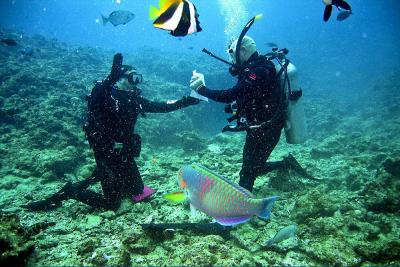PADI Certification Levels

OPEN WATER DIVER
This is the most common scuba certification in the world and is great for beginners. It is the starting point for your new favorite hobby! The certification consists of an online eLearning phase, a pool diving phase, and then you put your learned skills to the test with four open water dives in an ocean or lake.
Cost varies by location, but the great thing is, you can complete this certification at your own pace. There is no prior scuba diving experience required before starting this course. However, you will need to have basic swimming skills and be 10 years or older to participate.
Read more about how to get your Open Water Diver certification HERE. You can also visit our recommended certification organizations NOW.
PADI ADVANCED OPEN WATER DIVER
This certification is often sought after by scuba divers that are ready to go to the next level, beyond their basic Open Water Diver certification. This course continues your education and further develops your knowledge of diving skills. This is where the “Advanced” comes into play. A requirement for this course is that you have completed and earned your PADI Open Water Diver certification.
To start the course, your dive shop’s PADI instructor will advise you on constructing a learning plan of five total dives. The guided dives must include at least one “Underwater Navigation Dive” and one “Deep Dive.” The Deep Dive will teach and test you on the challenges you face when diving deeper in the water, such as the physiological and physical effects. You will also learn how to navigate the waters using your compass, kick-cycles, landmarks and more during the Underwater Navigation Dive.
Interested in developing your skills and reaching the next level of scuba diving? Learn more about the PADI Advanced Open Water Diver certification requirements and timing here. Click here to find a dive shop to get in contact with and ask about scheduling your course!
PADI RESCUE DIVER
Some divers say this is the most challenging course, but that it helps you gain confidence in your ability to handle difficult situations, prevent problems and be a safe diving buddy. In order to participate in this course, you must be at least 12 years old and have completed the Underwater Navigation Adventure dive. You will also need to have Emergency First Response Primary and Secondary Care training within the past 24 months.
During the course, you will learn and become comfortable with safety skills and problem solving skills in order to help you become a safer diving for you and your diving buddy. This knowledge will help you know what to look for and how to respond. Different skills and topics will include self rescue, rescuing panicked divers, unresponsive divers, stressed divers and also managing emergency equipment.
Even though this course is said to be challenging, it is rewarding when you have already learned how to safely react and respond in dangerous situations.
PADI MASTER SCUBA DIVER™
If you are serious about your passion for diving and are looking to influence others in the diving community, a Master Scuba certification could be perfect for you. To get to this point, you will have dove in a variety of underwater environments and had many different dive adventures.
For this certification, you must first start with earning the PADI Open Water Diver certification, then the PADI Advanced Open Water Diver, as well as the PADI Rescue Diver. Additionally, you will need to earn five PADI Specialty Diver certifications with a combination of at least 50 dives logged.
By taking the course you will become part of an elite group of divers that have earned their certifications through hard work and passion. Nothing is better than flashing the Master Diver card and seeing the respect among your fellow divers.
Overall the PADI world offers a variety of courses you can take to supplement your diving certifications. Use this infographic to help you decide which scuba diving certification would fit your needs and where you can go from there.
